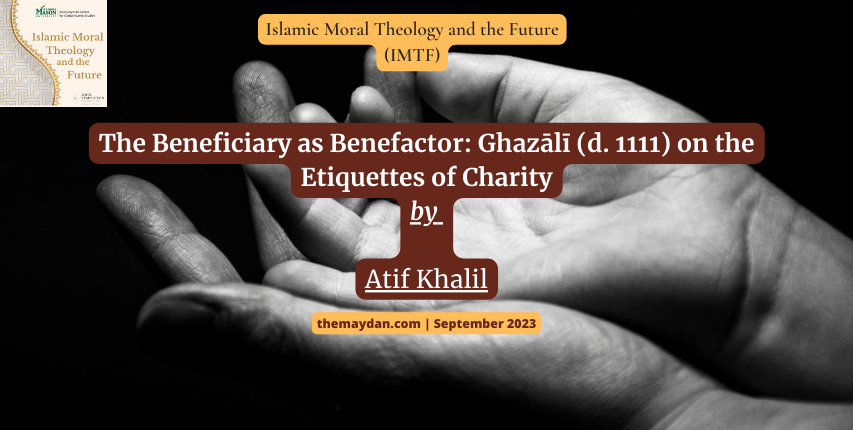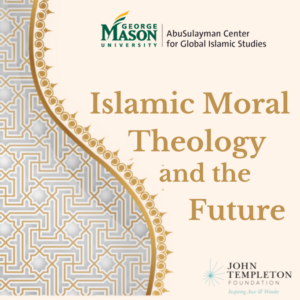

This essay is part of the Islamic Moral Theology and the Future (IMTF) Project, generously supported by the John Templeton Foundation, and co-led by Maria Dakake and Martin Nguyen. It specifically responds to Dr. Nguyen's line of inquiry. Click here to read all past contributions to Dakake and Nguyen’s respective lines of inquiry and stay tuned for new contributions from IMTF in its second year!
In his Oft-Repenting Ones, Ibn Qudāma (d. 1223) recounts the story of Awlāsī, a pious ascetic from the early centuries of Islam. It so happened that in his youth he stumbled across a sick, homeless man who was lying on the road. “I lowered myself before him,” Awlāsī said, “and asked, ‘would you like anything?’” The destitute man requested a pomegranate, which he promptly fetched. On placing the fruit in his hands, the man lifted his head towards his benefactor and prayed, “May God have mercy on you.” “Nightfall did not approach,” Awlāsī recalls, “until my heart was freed of the vanity in which I was in. I then set out desiring to perform the major pilgrimage.”[1] The simple act of selflessly attending to the need of the other resulted in the near-miraculous transformation of heart, opening for him the door not only of salvation but of sanctification.[2]
The story, typical of many such tales in religious texts, highlights a belief common to Muslims, namely that the true recipient in any sincere act of charity or gift-giving is the gift-giver, since to give is to receive, and to receive is to obtain more than one gave.
The story, typical of many such tales in religious texts, highlights a belief common to Muslims, namely that the true recipient in any sincere act of charity or gift-giving is the gift-giver, since to give is to receive, and to receive is to obtain more than one gave.
In Ghazālī’s (d. 1111) Book of the Mysteries of Zakāt, he devotes considerable attention to the rules of etiquette around the distribution of charity.[3] The concern he raises centers around the dangers of what are known in Arabic as mann and adhā, two qualities the Quran singles out as factors that invalidate the moral worth of one’s giving (Q 2:264).[4]
What precisely are mann and adhā? The former, Ghazālī clarifies, is a prideful reminder to the other of one’s benefaction and often entails expecting respect, deference, or service in return. As for the latter, it may involve an open or (as is more often the case) subtle shaming and belittling of the recipient.
Both vices, Ghazālī makes clear, are rooted in an ignorance of the actual state of the affair. The ignorance stems from the benefactor’s delusion that he is in fact doing the beneficiary a favor. While this may be how it seems on the surface, in truth, it is the recipient who is doing the giver a favor by providing him the means to offer to God what He has ordered him to part with. Without the recipient, he would be unable to actualize the virtue of charity necessary for his own ultimate felicity. In this respect, the poor man takes the place of God. Or, as the hadith puts it, “charity falls into the hand of God before it falls into the hand of the suppliant.”[5] And because He is the ultimate receiver (cf. Q 2:245), to be discourteous in the offering is to risk betraying the rules of propriety one owes God. In fact, the real trial is not so much that of the receiver in his condition of need, but of the giver who must relinquish a portion of his wealth by observing the appropriate etiquettes of giving.
For Ghazālī, another reason the beneficiary is the true benefactor is because through the act of charity, the giver is being purified not only of his sins, but also of whatever traces of avarice, greed, and miserliness that may afflict his soul––afflictions that could very well be the cause of great harm after death.
For Ghazālī, another reason the beneficiary is the true benefactor is because through the act of charity, the giver is being purified not only of his sins, but also of whatever traces of avarice, greed, and miserliness that may afflict his soul––afflictions that could very well be the cause of great harm after death. After all, how is one healed of these vices? For Ghazālī, the cure lies in giving generously, and this requires a party willing to receive. In this respect, the beneficiary has a power over the benefactor, since if he refuses to accept, the former is deprived of the cathartic effects of his own charity. And this is particularly the case when it might involve saintly recipients whose prayers could otherwise turn the lives of their benefactors around, either in this world or the next or both. The spiritual history of Islam is, in fact, filled with stories of poor, pious men and women of God or saintly scholars refusing alms if they felt the giver fell short in the sincerity, adab or state of joyful detachment that should accompany charitable giving. A well-known account of Junayd (d. 910) is illustrative. A rich man once approached him with a bag of money to distribute among his peers and disciples. The spiritual master asked him, “are you covetous for more?” to which he replied, “yes, indeed.” “Keep it,” Junayd said to him, “for you are more in want of it than we are.”
One of the reasons, for Ghazālī, that the benefactor may fall into the traps of mann and adhā is because he sees the recipient as someone inferior to him. After all, the receiver is deprived of what he himself has and stands in need of it for his own sustenance. While this may be true in the world, in the eyes of God it is the poor who have priority of rank, since as a hadith states, the righteous among the wealthy will enter paradise fifty years after the poor. There will be a greater accounting, for people of means, over how they spent their goods.[6]
For Hujwīrī (d. circa. 1072) the superiority of the poor rests on the grounds that the inner reality of the human being, which is that of an innate poverty (faqr; cf. Q 35:15), corresponds to their outer condition. They are, in effect, less deluded of the true nature of who they are in relation to God––“The Rich” (al-Ghanī)––unlike the wealthy who are easily mislead into believing in their own self-sufficiency and independence.[7] While Ghazālī’s own position regarding the superiority of the poor may be more nuanced than his passing marks suggest in the Mysteries of Zakāt, the point he makes is rudimentary but critical, and one often overlooked by those who fail to see beyond the veils of the dunyā or this lower world: despite all outward appearances, the wealthy have no reason to believe in their own eminence over those to whom they are obliged, by faith, to give. God has conferred on one wealth and entrusted him with the responsibility to give just as He has deprived the other of it and conferred on him the right to receive. And this is why Hasan al-Basri said, “If God so willed, He could have made you all wealthy without a single poor person among you, but He tests some of you by means of others.”[8]
The test was taken so seriously by some of the early pious folk that, as Ghazālī notes (following Makkī before him), when they gave charity, they would do so by placing the offering on their palms facing upward. This way they would assume the form of suppliants, since they saw their beneficiaries as benefactors, who had the upper hand, both literally and figuratively.[9]
Atif Khalil is an Associate Professor in the Department of Religious Studies at the University of Lethbridge (Alberta, Canada), where he has been teaching for fifteen years. He is the author of Repentance and the Return to God: Tawba in Early Sufism (Albany: SUNY Press, 2018), and numerous academic articles on Sufism, Islamic Theology and Philosophy, Virtue Ethics, the Judeo-Islamic Tradition, Orientalism, and the contemporary study of Islam. He is co-editor of In Search of the Lost Heart (Albany: SUNY Press, 2012) and Mysticism and Ethics in Islam (Beirut: AUB Press, 2022). At present, he is working on a monograph on the theory and practice of dhikr in Sufism, and another one on the mystical ethics of Ibn `Arabi. In 2009 he completed his doctorate at the Center for Religious Studies at the University of Toronto.
[1] Ibn Qudāma, Kitāb al-tawwābīn, ed. ‘Abd al-Qādir al-Arnā’ūṭ (Damascus: Dār al-Bayān, 1969), 230. A similar story is told of Sarī al-Saqaṭī. One day he happened to give Ḥabīb al-Rā’ī a crust of bread as alms as he was passing by his shop. Al-Rā’i responded with a prayer, “May God reward you.” “From the day when I heard this prayer,” Sarī would later recall, “my worldly affairs never prospered again.” The worldly loss turned out to be a spiritual boon because through it his earthly attachments were severed, and he was able to dedicate himself entirely to a life of prayer and contemplation. Hujwīrī, Kashf al-maḥjūb, trans. R. Nicholson (1911; reprint: Lahore: Islamic Book Service, 1992), 110-111.
[2] On accounts of repentance induced through acts of piety, kindness, or benevolent charity in early Islam, see Atif Khalil, Repentance and the Return to God: Tawba in Early Sufism (Albany: State University of New York Press, 2018), 67-74.
[3] On the eight inner requisites of charity, see Ghazālī, The Mysteries of Charity and the Mysteries of Fasting, trans. M. Abdurrahman Fitzgerald (Louisville, Kentucky: Fons Vitae, 2018), 21-43; Arabic, Iḥyā’ ‘ulūm al-dīn (Aleppo: Dār al-Wa‘ī, 1998), 1:368-380. I have worked closely with the Arabic text in conjunction with the English. The translations that follow are largely, but not entirely, based on Fitzgerald’s excellent work. Ghazālī’s discussion is an elaborate reworking of Makkī’s (d. 996) treatment of charity and the alms-tax in the Qūt al-qulūb, ed. Sa‘īd Nasīb Makārim (Beirut: Dār Ṣādir, 1995), 2:207-220.
[4] Do not invalidate your charity through mann and adhā (Q 2:264).
[5] Ghazālī, Mysteries of Charity, 30 (English); Iḥyā’, 1:373 (Arabic). Fitzgerald traces the tradition to Ṭabarānī’s Mu‘jam al-kabīr and Abū Nu‘aym’s Hilya.
[6] Ghazālī, Mysteries of Charity, 32 (English); Iḥyā’, 1:373 (Arabic).
[7] Hujwīrī, Kashf, 19-29.
[8] Ghazālī, Mysteries of Charity, 62 (English); Iḥyā’, 1:390 (Arabic).
[9] Ghazālī, Mysteries of Charity, 33 (English); Iḥyā’, 1:375 (Arabic); cf. Makkī, Qūt, 2:112.

